The Wildly Entertaining 1987 Adaptation of Stephen King's The Running Man Couldn't Be Timelier
The cult classic explore a bleak future where Fascism and cynical TV entertainment have formed a sinister alliance
A rumor circulated recently that puppy-killing Trump goon Kristi Noem was contemplating a reality competition where desperate undocumented migrants would compete for the unimaginable privilege of being an American citizen.
That might not seem like much of a prize at the moment, but it’s worth noting that the popular reality shows Making the Band and The Apprentice found contenders fighting to win an opportunity to work for Diddy and Donald Trump, respectively.
One is accused of being an abusive, drug-addicted, prolific sex trafficker. The other is rapidly transforming our country into a dystopian dictatorship. Yet they were both posited as dream bosses worth fighting to have a professional relationship with.
Noem insisted that no immigration-based reality show was in the works. It’s one thing to run the national government like a reality show, with a thin-skinned, easily-enraged reality host at the helm and television-trained sycophants, primarily from Fox News, competing madly for his favor. It’s another thing to turn the quest to become an American citizen into an actual reality show.
We’re not in the world that Stephen King, writing under the pseudonym Richard Bachman, chronicled in his 1982 novel The Running Man. We’ve stumbled into a future even bleaker and even more devoid of hope.
In Paul Michael Glaser’s 1987 adaptation of The Running Man, the villain is Damon Killian, a sleazy television professional played with just the right note of oily self-deprecation by Richard Dawson.
Dawson rose to fame as a castmember of the Nazi war-camp-themed small screen laugher Hogan’s Heroes and as the host of Family Feud.
That is the perfect background for playing a consummate phony who charms the blue-hairs in the audience with his cornball showmanship, despite being a sociopath who cares only about money, power, and ratings.
In that respect, our 2025 closely resembles the dystopian 2025 of King’s novel, except that in our sick world, the Damon Killian figure runs the government and not just a sketchy reality competition, but shares the same lack of principles.
In The Running Man, Arnold Schwarzenegger plays Captain Benjamin Stuart "Ben" Richards, the unfortunate denizen of a police state who is railroaded and sent to prison when he refuses to fire indiscriminately into a crowd protesting food shortages.
The muscle-bound protagonist’s heroism leads to a sinister state framing him as the “Butcher of Bakersfield”, an inhuman monster who kills women and children with glee.
Ben escapes a prison camp alongside his compatriots, William Laughlin (Yaphet Kotto) and Harold Weiss (Marvin J. McIntyre), but is captured while trying to flee with Amber Mendez (Maria Conchita Alonso), a television composer he has taken hostage.
Dawson’s preening villain sees dollar signs in the brawny prisoner. When Ben is reluctant to compete in the brutal reality program The Running Man as a “runner” being pursued by kitschy hitmen known as “stalkers”, Damon threatens to have William and Harold fight and die in his place.
The television bigwig’s word is less than meaningless. He lies about everything, but Ben doesn’t have a choice in the matter. He either dies for refusing to fight, or he dies fighting. Those are the only two options.
In this horrifyingly familiar world, the Military-Industrial Complex has been replaced by the Military-Entertainment Complex.
Damon might have the most important job in the world. He gets paid handsomely to keep the masses distracted from their misery by giving them violent spectacle to lose themselves in, where right and might are rewarded and criminality and wrongness are punished.
In the reality competition that gives the novel and the book its name, cursed contenders square off against stalkers, government-endorsed warriors with WWE-style gimmicks and flamboyant costumes, names, and gimmicks.
As in all authoritarian regimes, the powerful tell the powerless who to root for. The stalkers who hunt the contestants are posited as hard-working patriots who prove their love of the state by participating in its brutal spectacles. The runners are criminals scapegoated as enemies of the people whose violent deaths we’re supposed to cheer. No further evidence is necessary. The world is divided into baby faces and heels. Moral ambiguity doesn't enter the equation.
As is often the case, a science fiction writer will present a harrowing, horrifying vision of a terrifying future as a cautionary warning that is then turned into a contemporary reality.
Two years after The Running Man’s release, American Gladiators was launched. It retained the cornball patriotism, format, and aesthetics of The Running Man but cut the death.
Donald Trump is the first WWF president. He’s the first Commander-in-Chief to take his cues not from his predecessors in the White House but rather the steroid-addled goons on his good friend Vince McMahon’s tacky empire of testosterone.
The Running Man borrows its over-the-top macho aggression from professional wrestling as well as some of its supporting cast.
WWE Hall of Famer Professor Toru Tanaka plays Subzero, the first stalker Ben encounters and kills. Schwarzenegger’s fellow Predator costar and former Governor Jesse Ventura, meanwhile, plays Captain Freedom, a former stalker turned patriotic television personality whose code of honor and ethics make him an anomaly in a world without much use for either.
Ben shocks and impresses Damon and the live and home audience by becoming the first contestant to kill a stalker. The Running Man is a rigged competition, where winning is supposed to be impossible and losing/dying is inevitable.
Ben changes that. Damon wants the competition to be competitive enough to boost the ratings of what we are informed is the most popular show on the planet, but not in a way that might result in an outcome he does not desire.
The Running Man holds out the possibility of freedom and escape for contestants who beat the odds and survive the game. It's a cruel illusion, a mirage designed to make a rigged, impossible game that mirrors the rigged, impossible nature of society seem winnable.
Late in the game, when our hero is squaring off against Fireball (Jim Brown), he discovers the game’s sinister secret. While audience members are informed that runners who win the game are enjoying lives of comfort in a tropical paradise, they’re all quietly executed.
The Running Man is a game you’re not supposed to win, but formula dictates that Arnold Schwarzenegger triumph regardless of the circumstances.
Schwarzenegger’s presence invites certain expectations. The Running Man consequently manages to fit the requisite quota of campy one-liners into what is otherwise a grimly funny exploration of the complicated, fraught intersection of entertainment, politics, and authoritarianism.
In one of the film’s many suspiciously timely elements, the impossibly ugly Junkers of this dispiritingly relatable dystopia resemble Cybertrucks.
How considerate of Musk to provide a glimpse at the worst of the future in our unfathomably grotesque present.
It seems poor form for Musk to take great public delight in firing the very government workers who might otherwise buy his cars. In hindsight, Musk's choice to become the most hated man in the world was a poor business move.
Consumers are less likely to buy something if it’s strongly associated with evil, Nazis and Nazi evil.
A perfectly cast Dawson engages in bold self-deprecation as a smarmy game show host who appeals to the worst in humanity. His larger-than-life villain gives the state’s brutality and cruelty a show business sparkle.
Johnny Carson was reportedly Martin Scorsese’s first choice for the role of The King of Comedy. He turned it down on the basis that he was a one-take television funnyman, not a dramatic actor.
Unlike Carson, Dawson was an actor before becoming a television host, but it nevertheless feels like Dawson is playing himself on some level, in the darkest possible sense.
In The Running Man, Fascism has a bumping soundtrack, glitzy visuals, campy costuming, clever script, and elaborate choreography.
The only thing holding The Running Man back from greatness is pedestrian direction from Starsky & Hutch star-turned-filmmaker Paul Michael Glaser. Screenwriting legend Steven E. de Souza wrote a terrific script filled with memorable one-liners and set-pieces, but Paul’s direction is workmanlike at best.
The Running Man deserves an auteur in the director’s seat, someone who understands the story’s potent combination of incisive social satire and kinetic action.
That’s why I'm excited that Edgar Wright has directed a remake, starring Glen Powell in the lead and Colman Domingo in the Dawson role.
There’s never been a better time for a remake. There’s also never been a better time to revisit the original.




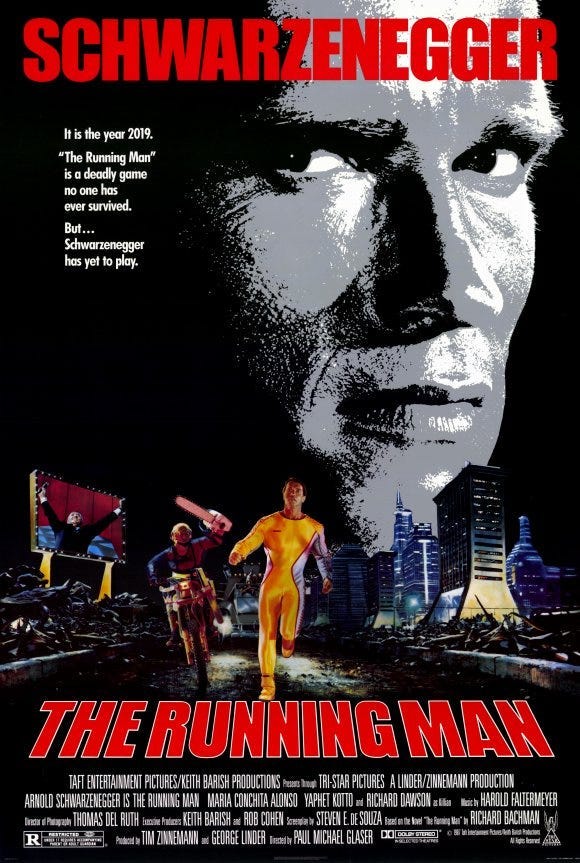
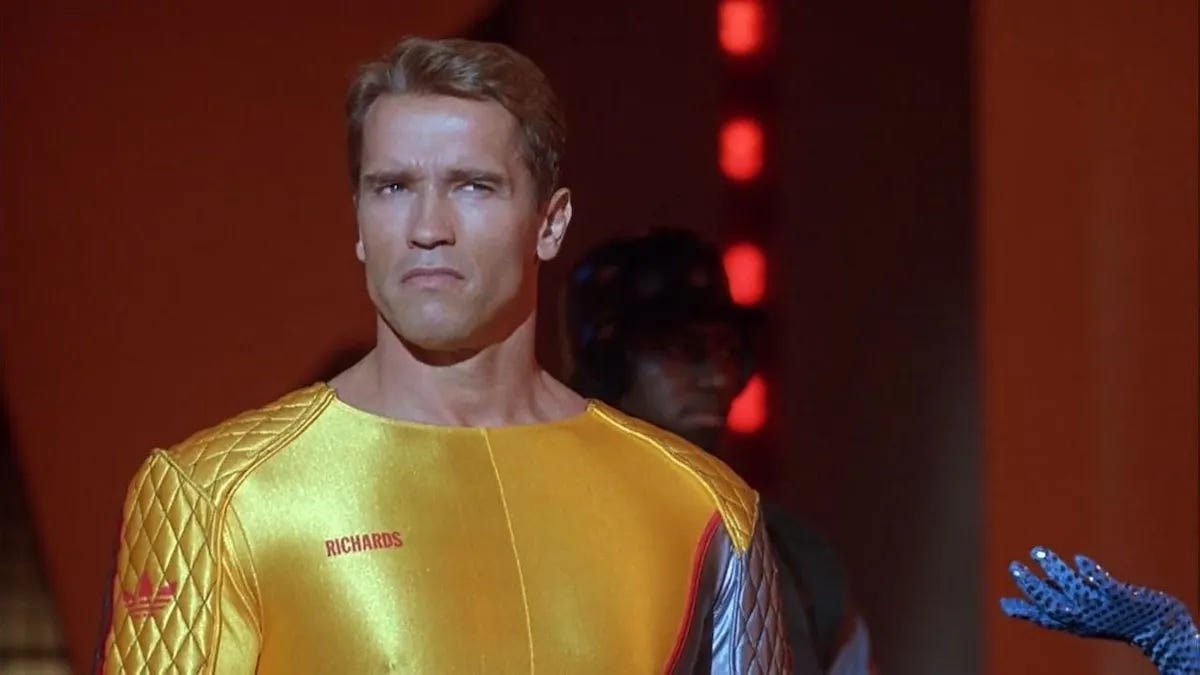

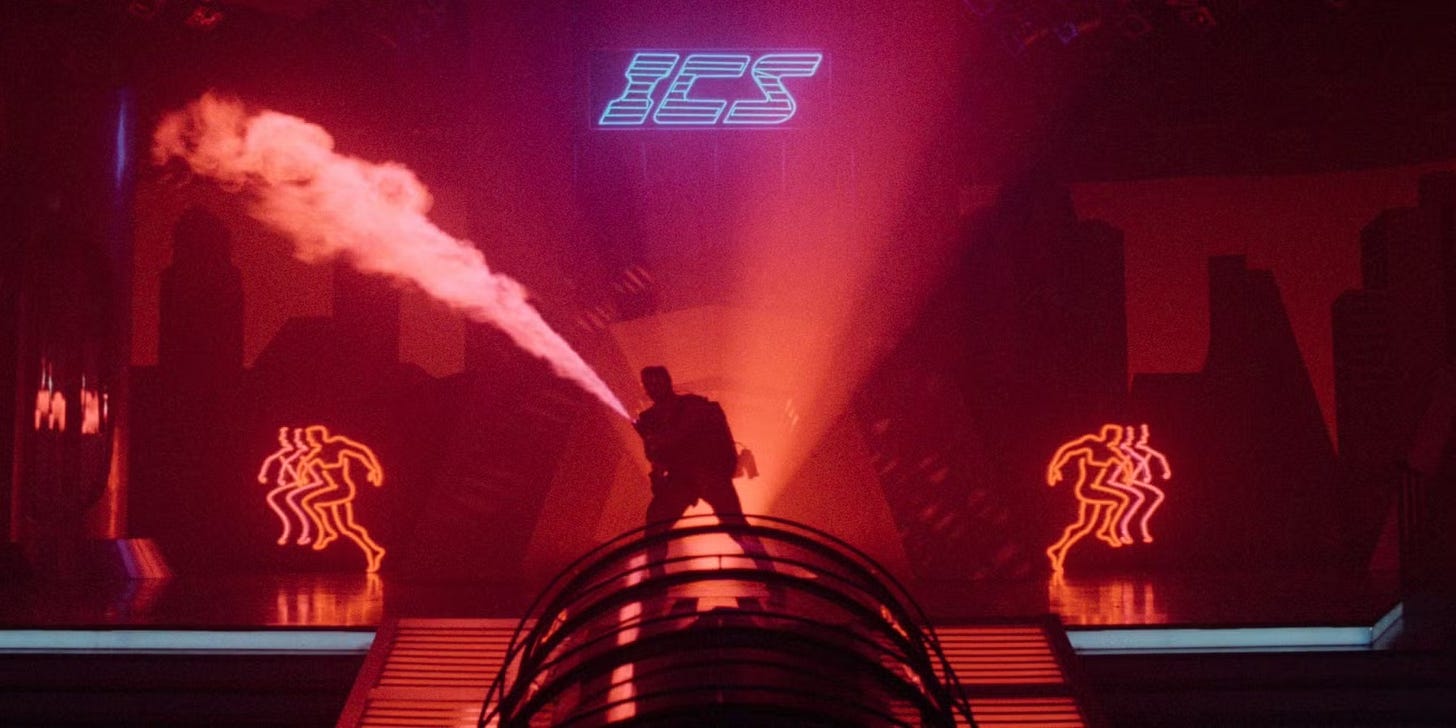
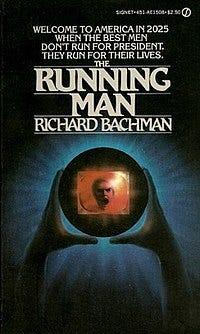
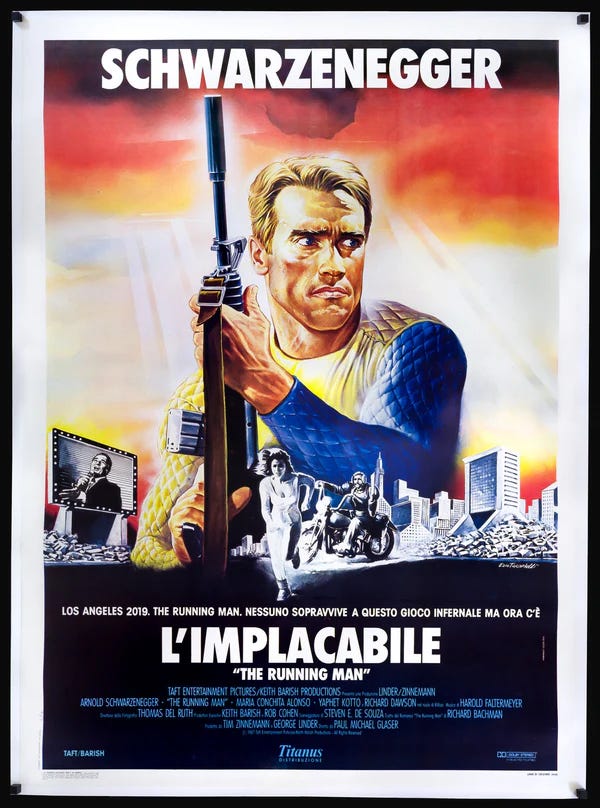
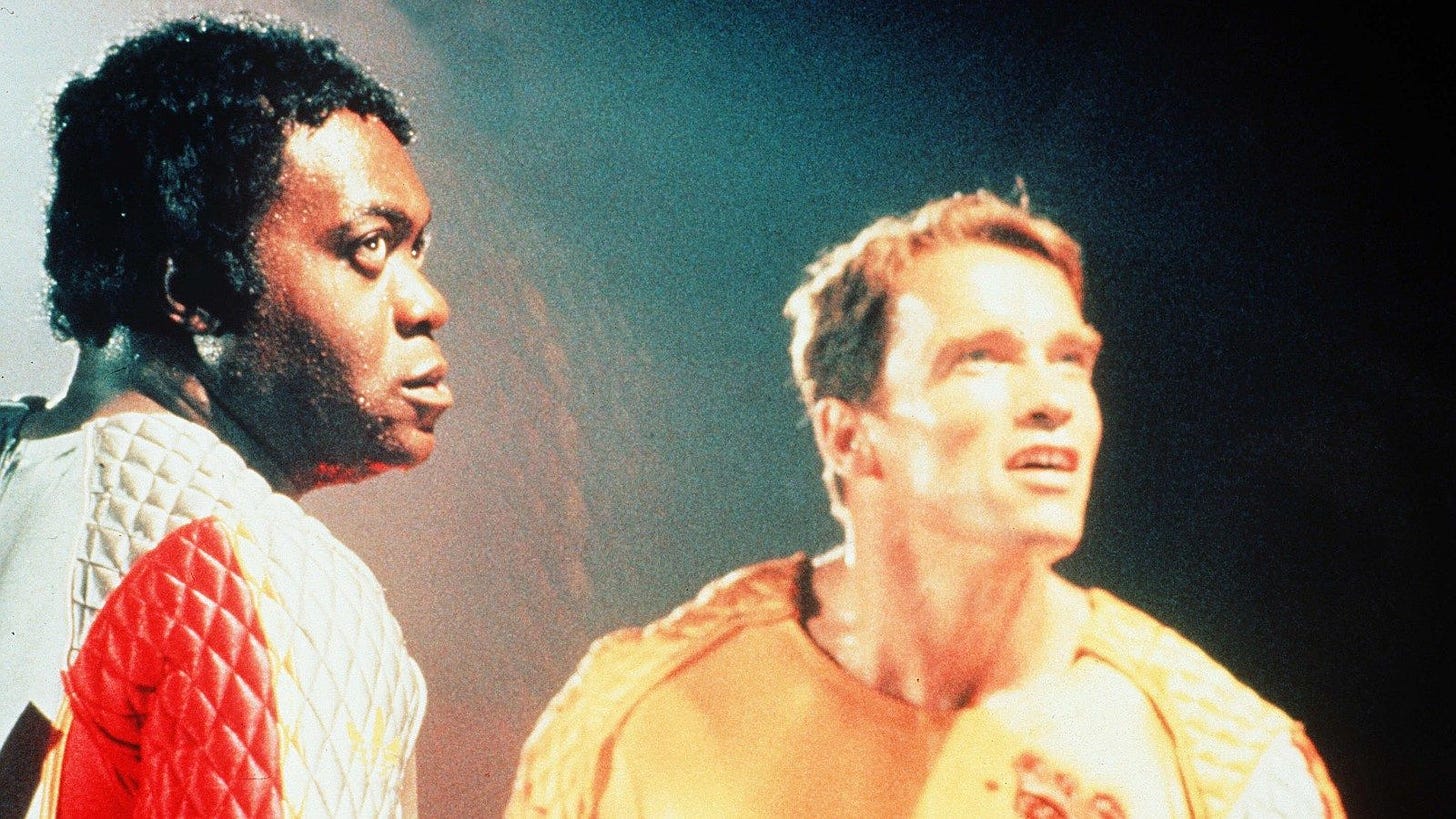
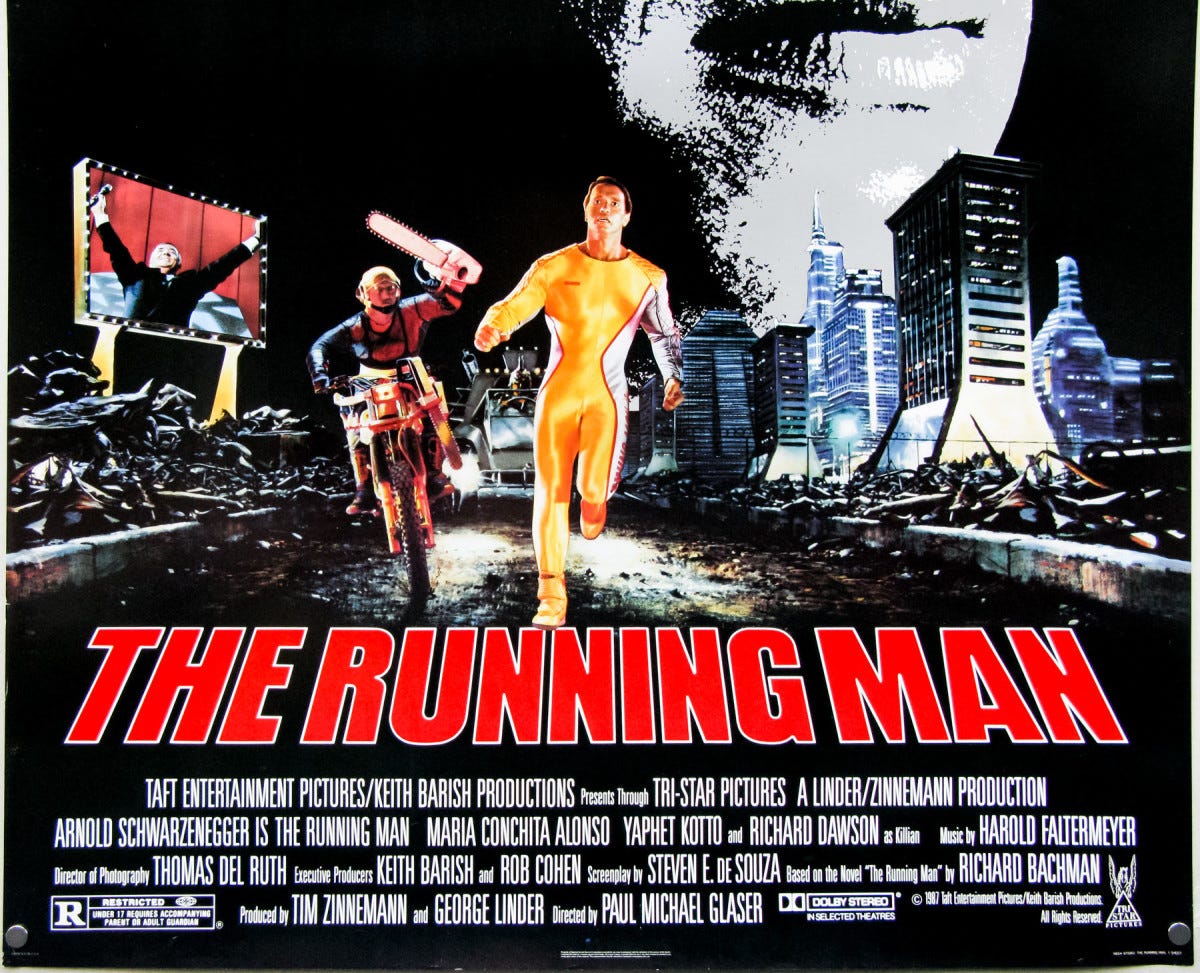
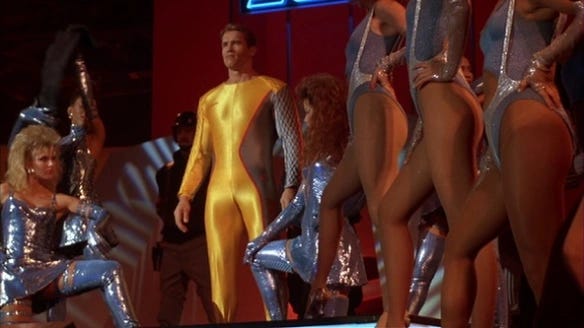
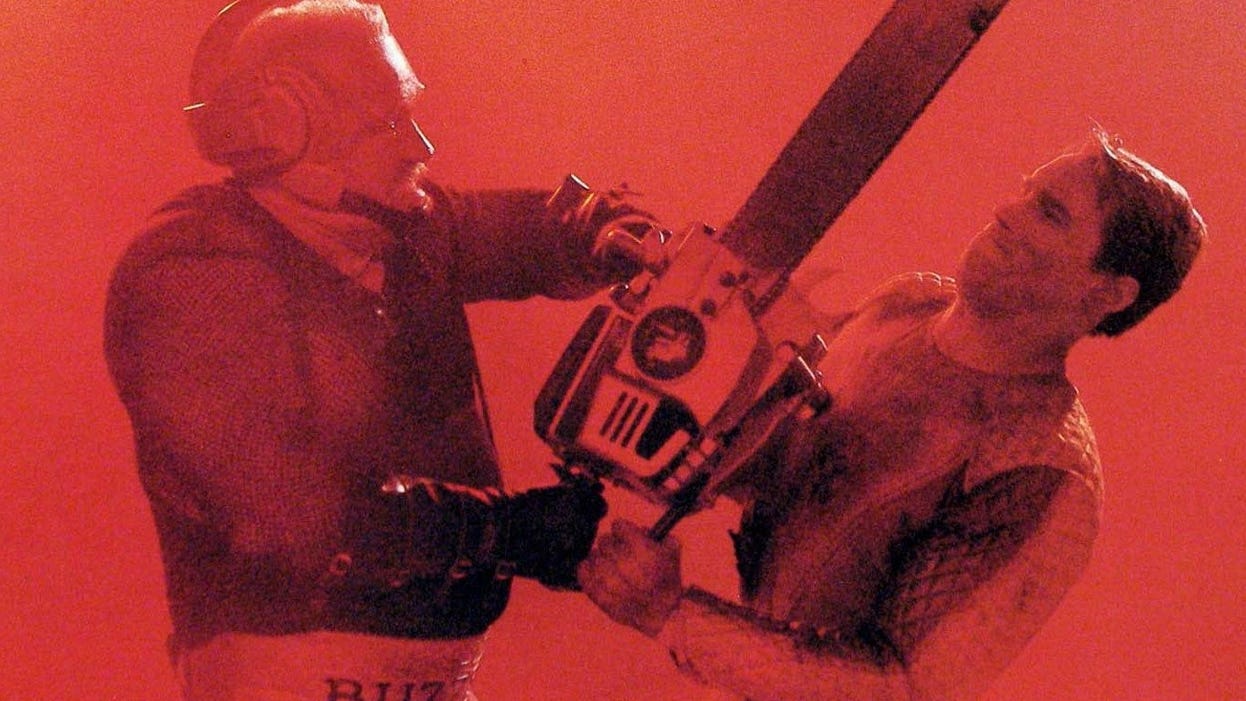
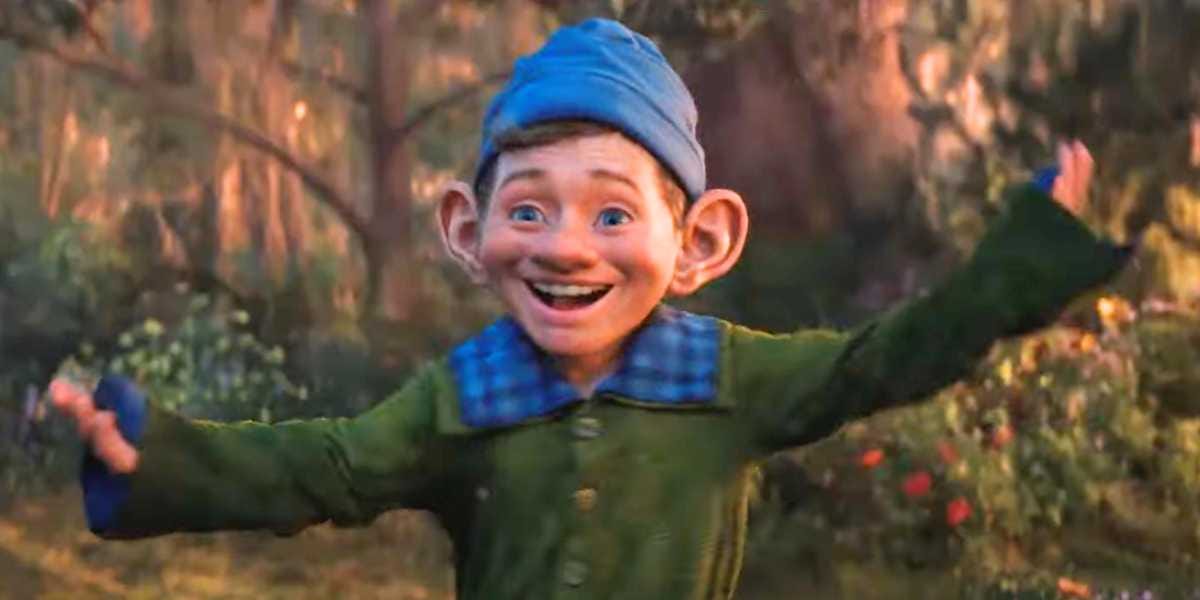

Correction: Richard Dawson was host of "Family Feud". But what an outstanding role he played in this film. The casting was kismet, and the performance was note-perfect. But as you say, Paul M. Glaser was a *terrible* director, and that dragged the film down to an extent.
I'm really curious to see the remake. I hope it's not soulless. The original film was not that, but it *was* flawed enough that a remake could theoretically improve upon it.
I loved this movie as a kid, and I still love, if on a slightly different level. looking forward to the Wright version. Hopefully that one isn't as prophetic. Thanks for writing this post.